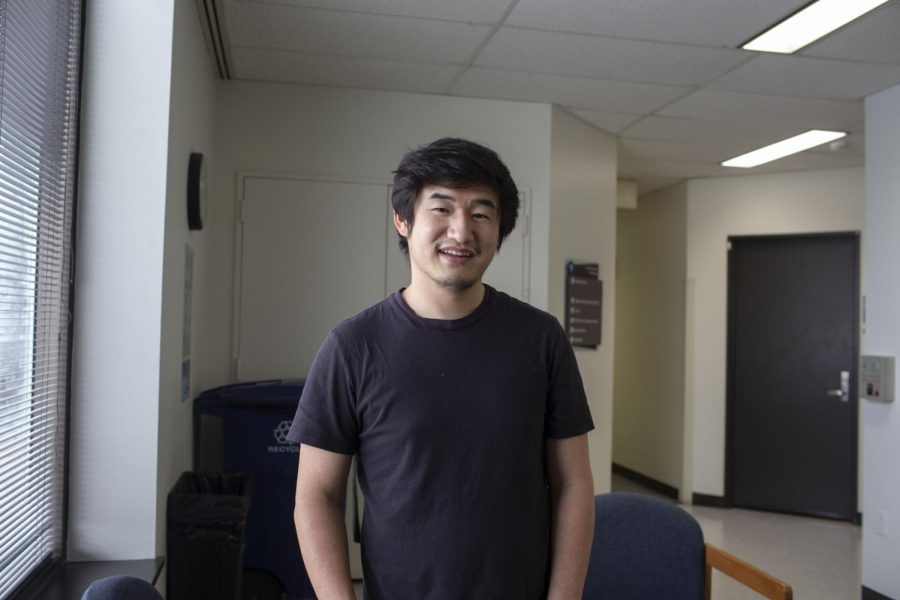New exhibit at Main Library honors Asian Americans at University of Iowa
The exhibit, “No Longer Invisible: Asian and Pacific Islander Students at the University of Iowa,” was curated by graduate student Jin Chang to tell the stories of Asian Americans on the UI campus.
Jin Chang, creator of the No Longer Invisible exhibit at the University of Iowa, poses for a portrait at the Lindquist Center on April 7, 2022.
April 7, 2022
When graduate student Jin Chang set out to research the student archives on Asian American organizations at the University of Iowa, they were surprised to find just one folder, labeled “Asian American Coalition,” with a single piece of paper inside.
Chang has since transformed that piece of paper into a collection of 58 oral interviews with Asian American UI alumni. Their stories will be told today at the Main Library’s launch of its newest exhibit, No Longer Invisible: Asian and Pacific Islander Students at the University of Iowa, right in time for National Asian Heritage Month.
The new exhibit is in conjunction with the Main Library’s current exhibit, We Are Hawkeyes: Celebrating 175 Years of Student Life at the University of Iowa.
At the launch, Chang will speak on the racialization Asian American students have historically experienced on the UI campus. Following the discussion, attendees can roam around the exhibit, exploring the oral history pop-up stands that include shortened versions of the interviews Chang conducted, many of which lasted over an hour.
The title, No Longer Invisible, was inspired by a presentation given by UI counselor Dr. Dau-shen Ju, called Asian Americans: Am I Invisible? in 1998. Chang said they recognize that this exhibit does not erase everything Asian America students have experienced on campus, but it is a step in the right direction.
“It was very clear that in 2021, Asian American were still very largely invisible on this campus,” they said. “But it does show that the university at least is willing to take seriously the fact that this was historically an issue, and I’m hoping that they still see there is an issue even if it’s better now.”
With little to go off of from the University archives, Chang said they turned to The Daily Iowan’s website, researching previous articles written about Asian American student organizations, and looking up the people mentioned. There are now several boxes of material on Asian student life in the UI’s student archives.
Related: Ph.D. student finds artistic recognition when selected to commemorate UI’s 175th anniversary
Chang said that the targeted shootings of people of Asian descent in early 2021 in Atlanta only added to the traumatic effects that COVID-19 had on the Asian American community, and they weren’t sure if people would want to talk about this topic with the rise of anti-Asian racism. To their surprise, people were more than willing to share.
“I’d thought that people wouldn’t want to talk about their experience at all just because there was just so much process, but the opposite happened,” Chang said. “Everyone wanted to talk about it.”
Aiden Bettine, community and student life archivist for the university’s archives, said oral history is beneficial because it tells a more accurate story by someone who has lived through it, and it allows the subject to control their representation.
The use of oral history in the exhibit is especially vital, because it allows the marginalized group to speak on their experience in a way in which their voice can be truly heard.
“It’s making it clear to people that their stories and their lives matter, but I’m sharing that value in the significance of what they’ve lived through,” Bettine said.
Many campus organizations have contributed to this cause, Bettine said, including the Vietnamese Student Association and the Asian Pacific American Cultural Center. Though the organization has not existed since 2017, many former members of Iowa’s Asian American Coalition were interviewed.
Jenay Solomon, an undergraduate engagement librarian at UI, has been the library’s liaison for the Asian Pacific American Cultural Center since 2018, and has worked closely with the group for National Asian Heritage Month.
Solomon said she is part Pacific Islander and wanted the opportunity to connect with students of similar cultures. As part of her work with APACC, she said the group has been working to have these student stories be told, so she was excited about the No Longer Invisible exhibit working towards that goal.
In the future, Solomon said she would like to see even more representation of Asian cultures at UI, expanding to students who are Native Hawaiian, or from other regions of Micronesia and Polynesia.
“I hope maybe going forward we can start to collect more of those stories too, since there are students out there, there’s just not a lot,” Solomon said. “Just to kind of tell their stories too as Asian Americans.”



